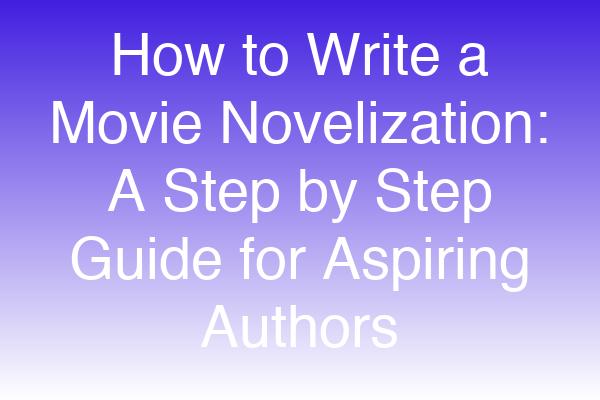
How to Write a Movie Novelization: A Step-by-Step Guide for Aspiring Authors
Writing a movie novelization can be an exciting and rewarding endeavor for any writer. It allows you to explore the world of a film in greater depth, providing insights into characters, settings, and plotlines that may not be fully realized on screen. In this guide, we’ll delve into how to write a movie novelization, offering tips and techniques to help you craft a compelling narrative that resonates with both readers and fans of the original film.
Understanding Movie Novelization
Before diving into the writing process, it's essential to understand what a movie novelization is. Essentially, it's a prose adaptation of a film's screenplay, transforming the visual storytelling of cinema into a written format. This genre not only retells the movie's plot but also expands on character motivations, inner thoughts, and background details that enhance the story.
Why Write a Movie Novelization?
There are several reasons why writers might choose to undertake a movie novelization:
- Creative Exploration: It allows you to explore characters and settings in ways that the film may not have fully captured.
- Fan Engagement: Novelizations can deepen the connection between fans and the film, providing additional content that enriches their experience.
- Writing Practice: It serves as a great exercise in adapting existing material, honing your skills in narrative structure and character development.
Step 1: Choose Your Film Wisely
When considering how to write a movie novelization, the first step is to choose a film that resonates with you. Look for movies that have a significant fan base or cult following, as these are more likely to attract readers. Consider films with rich narratives and complex characters, as they provide ample material to work with.
Step 2: Analyze the Source Material
Once you've selected a film, watch it multiple times. Take notes on key scenes, character arcs, and dialogue. Pay attention to the emotional beats and visual storytelling techniques used in the film. This analysis will serve as the foundation for your novelization.
Key Elements to Focus On:
- Character Development: Explore the motivations, backstories, and relationships of the characters.
- Setting Descriptions: Describe the environments in vivid detail to help readers visualize the world of the film.
- Plot Structure: Break down the film's plot into acts, identifying the main conflict and resolution.
Step 3: Create an Outline
With your notes in hand, create a detailed outline of your novelization. This should include chapter breakdowns, key scenes, and character arcs. An outline will help you maintain a clear structure and ensure that you cover all essential elements of the story.
Step 4: Expand the Narrative
As you begin writing, remember that a novelization is more than just a retelling of the film. Use your creativity to expand on the narrative. Here are some ways to do this:
- Inner Thoughts: Provide insight into characters' thoughts and feelings that may not be conveyed in the film.
- Backstory: Include background information that enriches the characters and plot.
- New Scenes: Consider adding scenes that were not in the film but fit within the narrative.
Step 5: Maintain the Film’s Voice
While you want to infuse your own style into the writing, it’s crucial to maintain the film's voice and tone. This will help ensure that fans of the movie feel a sense of continuity when reading your novelization. Pay attention to the dialogue style and pacing of the original film.
Step 6: Edit and Revise
After completing your first draft, take the time to edit and revise your work. Look for areas where you can improve clarity, pacing, and character development. Consider seeking feedback from beta readers who are familiar with the film to gain insights into how well your novelization captures the essence of the original story.
Conclusion: Bringing Films to Life Through Words
Writing a movie novelization is a unique opportunity to blend your love for storytelling with your passion for film. By following these steps and infusing your creativity into the process, you can create a novel that not only retells the story but also enhances it. So, pick a film that inspires you, dive deep into its narrative, and start writing your own movie novelization today!
Call to Action: Have you ever thought about writing a novelization? Share your thoughts in the comments below, and let us know which film you’d love to adapt! For more writing tips and resources, explore our other articles on creative writing.